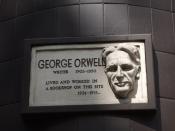George Orwell's Nineteen Eighty Four and Margaret Atwood's The Handmaids Tale are both novels in which the state, namely Oceania and Gilead, attempts to exert totalitarian control over the lives of its peoples. Through Orwell and Atwood's subsequent portrayal on the ensuing dystopias we are clearly able to see the respective states desire to control love and emotion, which are considered undesirable distractions, as a means of achieving the totalitarian control that they so desire. It is thus in the respective states attempts to control such undesirable distractions that contrasts occur in both Orwell an Atwood's portrayal of an intended utopia gone wrong,(dystopia).
Hence as O'Brien expresses to Winston in order to allow him to realise the power of the Oceanic state; the desire to control is their driving force towards power;
'If you want a picture of the future, imagine a boot stamping on a human face- forever.'
In Nineteen Eighty Four, Orwell opts for an omniscient third person narration.
The effect of this is that the reader is able to hear Winston's tale in an almost totally unbiased and emotionally defunct manner from a narrator who appears almost as if he were an objective reporter.
'The mask was closing on his face. The wire brushed his check.'
The effect of this is that a distance is created between the reader and the protagonist and, as the novel progresses, the technique emphasises the depressed and oppressed atmosphere created by the state. This awareness however is not because we are informed of his emotional state, as is the case with Offred, but because Orwell leaves us in a position of somewhat uncertainty. Thus Orwell thorough his third person omniscience invites the reader to fill in the emotional gaps for themselves. Consequently the horror of Winston's ordeal is made all the...


